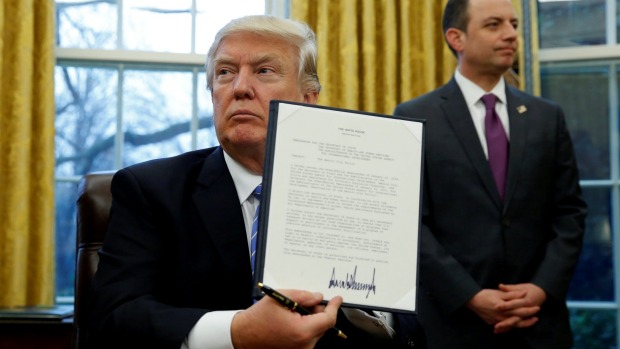THERE ARE A LOT of ways in which Donald Trump will hurt this nation, but none may be greater than his war on global trade. While Trump’s xenophobia and bigotry can be easily explained as the natural evolution of two decades of vitriolic Republican rhetoric, his sustained opposition to the world order first envisioned in the twilight years of the Second World War is actually a regression to an older American tradition: isolationism. If Trump succeeds in his calls to shred international trade deals and impose tariffs on America’s leading trade partners, the resulting conflict could potentially lead to the last war of human history.
First some backstory.
As the momentum shifted in favor of the Allies during World War II, leaders and policy makers in Europe and the United States began drawing up plans for the post-Fascist world. It was recognized early on that the largest contributing factor to a war that killed some 80 million people was the economic conflict and instability of the 1930s. Economists and politicians agreed that to promote peace they had to promote prosperity and link the nations of the world through trade and commerce, so that any form of international conflict would countermand national economic self-interest. In other words, nations that trade with each other are nations that don’t fight each other.
This idea of peace through globalization was first codified at the Bretton Woods Conference in July 1944, where delegates from 44 Allied nations met to formalize a framework for international monetary policy, commerce, and finance. Built on the work of economists John Maynard Keynes and Harry Dexter White, the conference saw the birth of several global institutions including the International Bank for Reconstruction and Development, the International Monetary Fund, and the World Bank. As articulated by US Treasury Secretary Henry Morgenthau, these international organizations would bring about the end of economic nationalism. Importantly, it was agreed that the wealthiest and most powerful Western nations, especially the United States, would bear the greatest burden of this new economic internationalism as a price for governing its systems.
Imagine a time when American leaders asked the nation to sacrifice for the greater good of the planet!
The foundations laid at Bretton Woods eventually manifested in the formation of the World Trade Organization, established to regulate and negotiate international trade. It also served as the framework for all future international trade agreements, promoting free trade across the globe. As a result, since the close of World War II, democracy has become the dominant political system across the Earth, economic growth has risen to levels unimagined since the start of the industrial revolution, and humanity has been witness to a technological revolution unlike any other in human history. Most importantly, globalization has prevented world war.
Although Bretton Woods has been recognized as perhaps the most successful international conference of its kind, and despite the fact that the world has not been subjected to a large global conflict since the end of World War II, free trade is not without its problems. Critics point to the emergence of transnational black markets, rising income inequality, worker exploitation, and capital flight. While the overall global community benefits, the poorest and least educated among us see jobs and opportunities vanish and hope disappear. It’s as true in India as it is in Pennsylvania. Globalization does not raise all ships.
An argument could be made that the globalized international system, shaped and transformed over the last 70 years by corporations and international banks to benefit the wealthy over the poor, is a major contributing factor to the rise of terrorism. Because while nations depend on free trade, the individual suffers, and that suffering leads to anger and resentment and extremism.
Enter Donald Trump: a self-absorbed Know-Nothing with strongman tendencies whose improbable rise is fueled by resentment over the current international system. Partly born out of his willingness to say anything to get himself elected, and partly from his mad ignorance, Trump has vowed to undermine the global economic system.
Trump has already pulled out of TPP and pledged to renegotiate NAFTA, threatening even to scrap it. He’s actively called for a rebirth of economic nationalism, and a policy of “America First.”
The question is not whether international trade should be reexamined. Economic globalization, as it stands, existing in a world of inherent inequalities, is not sustainable. But to allow Donald Trump to trash that system is an invitation to disaster.
It is easy to imagine a trade war with China spiraling out of control. Nothing to mention about the loss of capital at home. And as we cut the links that bind us, would our allies come when called? The entire modern-day international order, with the United States at its center, begins and ends with Bretton Woods and extends to everything beyond. And this world order is based on a supposition thought impossible today: that the United States would sacrifice slightly more than everyone else in order to deliver a Pax Americana. An unprecedented era of peace is now in danger of crumbling.
Let’s be clear one last time: Donald Trump is a danger to international peace. If he continues on his path to undermine a web of agreements that have kept most of us safe for nearly a century, for the sake of a few thousand jobs in the rust belt, he may very well be the last American president.



